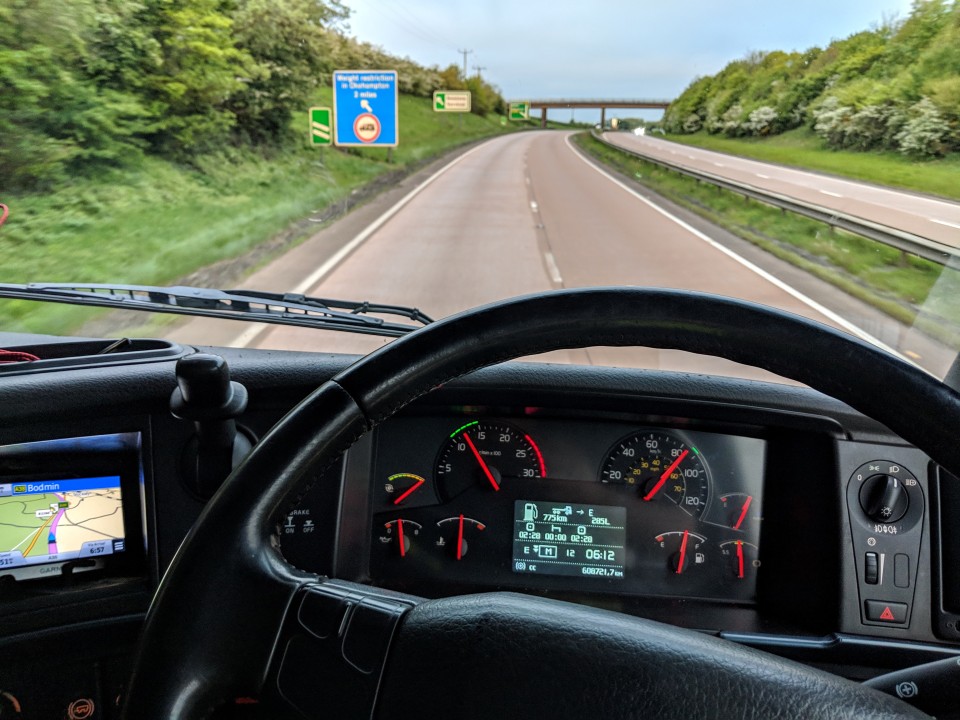
Susie Jones
Як бути здоровим водієм вантажівки
Створено: 27.08.2024
•
Оновлено: 27.08.2024
Водіння вантажівок, будучи складною професією, часто пов'язане з тривалим робочим днем, сидячим способом життя і тривалим перебуванням далеко від дому, що часто може негативно позначитися на здоров'ї багатьох водіїв.
Шкідливі звички, такі як споживання фаст-фуду, недостатня фізична активність та порушення режиму сну, можуть призвести до потенційних ускладнень у майбутньому. Але як підтримувати хорошу фізичну форму водієві вантажівки? Це легше сказати, ніж зробити, але ми склали список порад, які допоможуть вам залишатися на висоті, перебуваючи в дорозі.
Шість головних порад для збереження здоров'я в дорозі
1. Зволоження
Проста порада і товар, який ми часто сприймаємо як належне, проте більшість проблем зі здоров'ям виникають через зневоднення. Регулярні ковтки води або кабачкового соку протягом дня виведуть метаболічні відходи і токсини з вашого організму і зроблять вас більш енергійними і бадьорими. Тримаючи при собі багаторазову пляшку з водою, ви не лише нагадуватимете собі про необхідність пити, але й не завдаватимете шкоди довкіллю.
2. дієта
Спокуса перекусити фаст-фудом після довгого дня - це те, з чим ми всі можемо зіткнутися, однак, так само, як і підтримання водного балансу, ваш раціон відіграє важливу роль у вашому здоров'ї, а також у тому, як ви почуватиметеся протягом дня.
Водіям вантажівок рекомендується харчуватися три-чотири рази на день: два прийоми їжі та два перекуси або два прийоми їжі та один перекус. Намагайтеся дотримуватися плану харчування та перекусів з високим вмістом омега-3, заліза та вітаміну С, наприклад, зелені листові овочі, риба та фрукти. Уникайте частого вживання їжі та напоїв, таких як макарони, хліб, солодкі напої та стимулятори, такі як кава та енергетичні напої.
Ознайомтеся з нашим списком корисних закусок, які можна взяти з собою в таксі:
Батончики гранола
Енергетичні батончики
Попкорн.
Горіхи
Сухофрукти
Чорний шоколад
На додаток до придбання здорової їжі в дорозі, іноді може бути корисніше та економічно вигідніше готувати їжу самостійно. [Frieghtech] (https://freightech.us/easy-meal-ideas-for-truck-drivers/) має фантастичну добірку рецептів, які допоможуть вам підтримувати здоровий раціон під час роботи.
3. Сон
Через специфіку роботи водієві вантажівки буває важко висипатися, що може призвести до згубних наслідків для всіх, хто перебуває на дорозі.
Прості поради та підказки, такі як наведені нижче, допоможуть вам гідно відпочити вночі:
Створіть у кабіні обстановку, в якій ви почуватиметеся як удома. Ознайомтеся з нашою статтею про те, як зробити кабіну вантажівки домівкою
Зберігайте спальне місце темним
Гарячий душ: На нашій сторінці [карти] (https://snapacc.com/map/) ви можете знайти, на яких стоянках для вантажівок є ця послуга.
Спробуйте кілька додатків, які допоможуть вам заснути
Знайдіть ідеальне місце для паркування з мінімальним рівнем шуму та перешкод. Наш додаток для вантажівок пропонує 5 000 місць для паркування HGV (великовантажних автомобілів) по всій Європі, а наша команда [SNAP Access and Security] (https://snapaccessandsecurity.com/) може запропонувати індивідуальні рішення з безпеки, які дозволять вам спати спокійно, знаючи, що ви та ваша вантажівка в безпеці.
4. фізичні вправи
Одна з найскладніших порад, якої важко дотримуватися в дорозі, але, тим не менш, дуже важлива. Довгі години сидіння протягом дня можуть призвести до порушення постави, болю в спині та потенційних ускладнень зі здоров'ям. Після довгого дня за кермом може виникнути спокуса сісти і розслабитися, однак, швидка 15-хвилинна фізична активність, така як ходьба або розтяжка, може допомогти вам відчути себе бадьорим і менш напруженим.
[HMD Trucking] (https://www.hmdtrucking.com/blog/truck-driver-exercises-workout/) має кілька корисних вправ, розроблених для водіїв вантажівок, якщо ви хочете включити кілька видів фізичних вправ у свій розпорядок дня.
5. Вітаміни
Перебування в дорозі цілий день може ускладнити отримання всіх необхідних вітамінів. Щодня приймаючи полівітаміни, ви можете зміцнити свою імунну систему та зберегти здоров'я.
Психічне здоров'я
Ми знаємо, що піклуватися про своє фізичне здоров'я в дорозі важливо, але скільки часу водії вантажівок приділяють своєму психічному здоров'ю?

Благодійна організація Mind, що займається питаннями психічного здоров'я, опублікувала статистику, згідно з якою 30% захворювань, пов'язаних з роботою, у транспортно-логістичній галузі спричинені тривогою, самотністю, стресом і депресією, про які працівники повідомляють самі. Вони також припускають, що ця цифра може бути вищою, оскільки більшість людей не звертаються по допомогу, якої вони потребують. Крім того, 95% людей, які перебувають на лікарняному, не називають справжню причину своєї відсутності на роботі, якщо це стосується їхнього психічного здоров'я.
Дотримання наведених вище порад і рекомендацій може мати позитивний вплив на ваше психічне здоров'я. Крім того, важливо вести відкриті та чесні розмови з іншими водіями вантажівок, керівниками або диспетчерами.
Чи можуть фізичні вправи зробити вас кращим водієм?
Здоровий спосіб життя не лише покращує психічне здоров'я, але й, як свідчать дані, робить вас кращими водіями. Дослідження показало, що водії, яких просили робити фізичні вправи щодня, повідомляли, що їм було легше повертати голову, вони могли більше обертати тулубом і швидше сідати в машину.
Що найважче у роботі водія вантажівки?
Довгий робочий день - один із найважчих аспектів роботи водія вантажівки. Далекобійники часто стикаються з великими кілометражами та асоціальними годинами роботи. Ці довгі милі та асоціальні години можуть призвести до нездорового способу життя.

Наскільки шкідливо бути водієм вантажівки?
Через спосіб життя багатьох водіїв вантажівок вони в середньому статистично більш схильні до проблем зі здоров'ям, ніж люди інших професій. Водії вантажівок часто стикаються з низкою перешкод, таких як тісний робочий простір, стресові ситуації, незвичний режим сну та нестача поживної їжі, які впливають на їхнє здоров'я.
Підтримання здорового способу життя водія вантажівки вимагає свідомих зусиль, але користь від цього цілком виправдовує себе. Наведені вище поради допоможуть вам взяти під контроль своє здоров'я та покращити самопочуття. Слідкуйте за новими порадами та рекомендаціями від SNAP.



